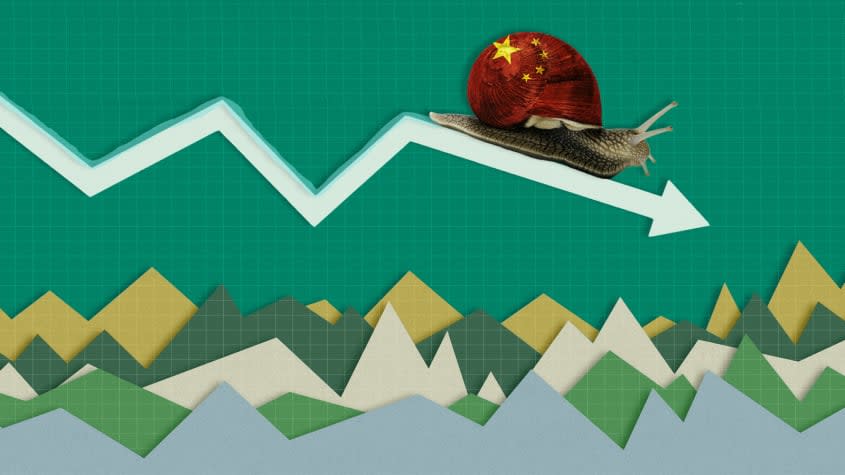China's economy is slowing down. Is it permanent?

Is the era of China's explosive economic growth coming to an end? Analysts have long believed China would someday overtake the U.S. as the world's biggest economy, the Economist reported, but the country's shrinking workforce and slowing productivity raise questions about whether the goal is attainable. If China can't catch up to the U.S. by the middle of the 2030s, "it may never do so."
The analysis comes amidst fresh signs of economic weakness in China. The country relies on exports to drive its economy, the South China Morning Post reported, but May exports were down 7.5 percent from a year earlier. The COVID pandemic and the war in Ukraine have altered China's upward path, Axios reported — those events "prompted countries around the world to reassess trade relationships and the risks of relying on rivals for core products." Indeed, there is growing talk in the U.S. of "decoupling" from China as tensions between the two countries rise.
Perhaps the biggest long-term challenge facing China is demographic decline: The portion of residents above the age of 60 is expected to rise by one-third by 2050, Politico reported. The young people who remain may not be all that interested in picking up the slack. CNBC reported that "light labor" — a Chinese version of "quiet quitting" — is becoming popular: A quarter of college graduates are underemployed, and the country faces a record-high youth unemployment rate.
What are commentators saying?
"So much for the Chinese economic boom," Desmond Lachman wrote for Barron's. Like the United States at the onset of the Great Recession in 2008, China is experiencing the collapse of housing and credit "bubbles," which in turn has sucked the energy out of a once-vigorous economy. That raises the potential of a "lost economic decade" — a stagnating economy — akin to what Japan experienced after its skyrocketing economy petered out in the 1990s. And it means that China probably won't beat the U.S. economy anytime soon. "We will find that the Chinese economy had clay feet."
China's future isn't what it used to be, Josef Joffe wrote at Tablet. Overinvestment in the housing market is one problem: There are an estimated 65 million unsold apartments in China. "This misdirected capital could have been put to more productive use." But "disastrous demographics" are also the culprit. "By midcentury, China will be the oldest big economy in the world." The economic headwinds aren't just a blip. The causes of the economic slowdown "are not fleeting."
"I believe China will continue to prosper," former Treasury Secretary Steven Rattner wrote in The New York Times. It's true that trade restrictions imposed by Presidents Trump and Biden are taking a toll, as are recent U.S. restrictions on technology sales to China. But China also leads the world in battery manufacturing, electric vehicle sales and solar panel production. "We should not delude ourselves with the fantasy that China is going to fall under its own weight."
What's next?
Chinese leader Xi Jinping still wants to overtake the U.S., Michael Schuman wrote at The Atlantic, and now he's looking to do so by re-orienting the economy away from the West. But the West — and indeed, the United States — have driven China's economic growth. Now "the two countries have come to see their ties as a source of risk and vulnerability." So China is shifting its focus to countries, like Russia, it sees as "less threatening."
But the two countries are still deeply intertwined for now. That means the weakness of China's economy has ramifications in America, CNN reported. The tensions between Washington and Beijing "have spooked investors." The fallout could actually be wider than that: American companies with operations in China "stand to lose if the economy continues on a downward trajectory."
All these factors could mean that China's rise as an economic and world power has already peaked, Ian Bremmer wrote at Gzero Media. But maybe not: Even if China's economy is growing slower than it once did, "it is still growing faster than America's." And its role as the heart of the global supply chain means that decoupling from the U.S. "will be slow and incremental rather than sudden and absolute." The challenges facing China are great, but "it still has substantial upside."
You may also like
4 things to consider when leaving an inheritance

